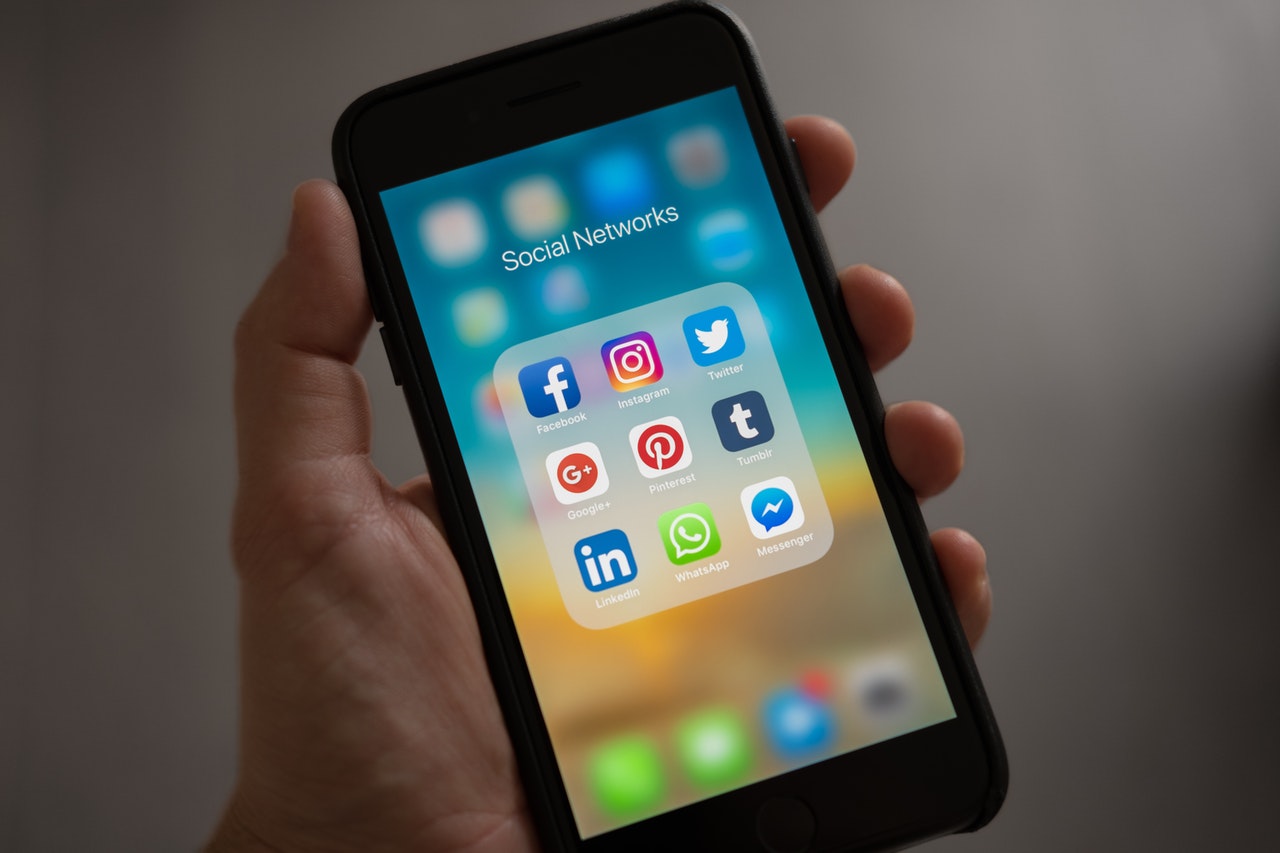Affiliate disclosure
About our ranking
10 Ways that Social Media Affects Mental Health

With so many of us using some form, or often multiple forms, of social media, and instances of anxiety and depression being on the rise, it’s not uncommon to wonder if the two are somehow linked. The topic can be pretty confusing, though, as articles can be found that point to a direct correlation between social media use and mental health, while others insist there is little to no link.
However, we at BetterHelp have dug pretty deeply into the topic and analyzed various studies to come up with a definitive list of 10 ways in which social media affects mental health, both positively and negatively. One thing is certain: how social media affects people is at least somewhat dependent on the person, and too much of even a good thing can be bad.

How Social Media Can Affect Mental Health
Positive Mental Health Effects of Social Media
1. Increased Connectedness
Though not connecting in person, social media allows us to connect with friends, family, coworkers, and just about anyone else whether they’re just down the street or live in a different country. Truly, being able to communicate with others is just at our fingertips, and on our own time – with this comes decreased social pressure and an ability to regularly keep in contact with people whom we otherwise might not be able to. We can send messages, pictures, and even videos easily and pretty seamlessly.
In this day and age of COVID, ongoing lockdowns and limited in-person interactions, social media has been a truly invaluable tool in keeping us somehow connected with our loved ones.
2. More Peer Support
Particularly for those with mental health conditions that can make connecting with others difficult, such as people on the spectrum or those with severe depression, social media offers numerous platforms that allow for communication with significantly less social pressure.
Many people with various mental health conditions feel a greater sense of support, validation, and belonging by posting about their mental health (or just about life in general!), and talking with others who are in similar circumstances. Mass posting and sharing allows for a vast quantity of ideas to be shared, and allows us to fairly easily identify and “talk with” those with similar interests and values.
For example, many people with autism have a difficult time making social connections, reading social cues, and feeling a sense of belonging with others. Social media helps remove many of the physical social barriers and allows for a greater sense of safety by allowing communication to occur from the comfort of one’s own couch and without being in-person. In fact, one study found that 84% of people with autism spectrum disorder (ASD) who used Facebook (to a certain degree) were overall happier and felt more socially connected than those with ASD who did not.
3. Idea Sharing & Spread of Information
Individuals, companies, and organizations alike have turned to social media to get the word out about just about anything. If you’ve lost your dog, you can effortlessly use social media to share pictures of your dog and get the word out that it’s gone missing, and this information can be shared to hundreds or thousands of people in a very short time frame, thus resulting in an increased likelihood of the dog being found and returned to you!
Many companies and organizations use social media for advertising, like sales on Alice and Ames dresses. Or to get the word out about their values, promote events, and to post job openings. These can similarly be shared many thousands of times in a matter of hours or even minutes, enabling these places to easily alter their reputation (for better or for worse), get more sales, and obtain new employees quite easily and quickly.
Non-profits also frequently use social media to get the word out about local events, be they to raise funds, help shelter dogs get adopted, clean up a local park, or help families in need. With social media, getting the word out about just about anything takes no time at all.

Negative Mental Health Effects of Social Media
4. It’s Addicting
Most of us have experienced the social media “black hole.” You’re on your phone, scrolling through posts, and before you know it half an hour has passed – or worse, several hours! Alternatively, even if you don’t have much time, many people find themselves checking social media every time they have a couple of spare minutes. Why?
Research suggests that social media activates the pleasure receptors of the brain, and immediate feedback (ex: “likes” on posts, friend requests, shares, and so on) cause a temporary dump of dopamine. Just as with other addictions, over time our tolerance to this increases and we feel as though we need more and more to get the same effect. This can have a detrimental effect on well-being, as those addicted to social media are likely to spend time on these platforms rather than engaging with others, getting out to do certain activities, being in the moment, and so on.
With countless influencers and ads, social media is lulling millions into over-spending. Over-spending is another addiction in and of itself. And while good deals can be shared, like ways to make money online with surveys or clearance markdowns at Whole Foods, really, social media posts are encouraging people to over-spend. If you've got extra time to spend, tuck it in your kid's college savings plan. Or towards your student loan debt or other bills.
5. Connected, But Not Really
Although social media certainly has the perk of allowing us to engage with others easily even from far away, it can also negatively influence connections. For example, social media often winds up becoming a replacement for actually spending time with others. Chatting with a friend on social media becomes the new norm over meeting up to talk; posting a quick comment or seeing someone else’s photos makes us feel like we’re “in the loop,” even though what is posted on social media is typically a very limited (and potentially unrealistic) view into that person’s life.

While social media can increase connection for some, if used too much it can result in decreased connection and a loss in ability to genuinely interact with people in-person. Humans, even the most introverted of us, are social, community-based creatures. Without meaningful relationships and in-person connectivity, even the biggest loner can feel isolated.
6. Physical Health
As we rely more and more on technology and social media, humanity as a whole is becoming more sedentary. This results in an increased risk of heart disease, type 2 diabetes, joint health degradation, muscle atrophy, and obesity. In fact, because a sedentary lifestyle is linked to so many significant health risks, being sedentary is the “fourth leading risk factor for death worldwide,” according to the Noncommunicable Diseases Alliance. Additionally, decreased physical health typically correlates with a subsequent hit to mental health, too!
7. Depression
Studies are finding that those who spend a significant amount of time (several hours) each day using social media platforms experience a 13-66% increased rate of depression than those who use it the least (less than an hour per day). While more research is needed, as these findings don’t necessarily mean that social media is the sole cause of this depression increase, it’s known that the social interactions on social media are typically less personal and meaningful than those obtained in person.
There are some caveats to this: as mentioned above, some on the autism spectrum report just the opposite effect, and those who still have high rates of in-person social interaction but who are also quite active on social media don’t seem to experience an increase in depression with increased social media use.
8. Over-Validation
While the ability to easily share ideas, information, updates, and more certainly has its benefits, one of the inherent issues with social media is that it results in instant validation. When someone likes, shares, and posts a positive comment on your post, it feels, well, good! While we have evolved to be drawn to those who share similar ideas and values for the sake of self-preservation, having those things constantly validated by others can make us less equipped to healthily handle criticism or different ideas and perspectives.
Additionally, like it or not, not everything on the internet is true! Social media allows us to access and share just about anything; unfortunately, many people use social media as their primary “source” for news and the like, and don’t often bother to dig deeper and fact check things before posting them. When others like or agree with the post, it further validates that this particular idea or piece of information is true…even it if isn’t.

We are beginning to lose the ability to find common ground with those who differ from us or to see things from perspectives different than our own, because we’re too busy seeking instant validation from those who are similar to us. And with that, we lose the opportunity to connect and build positive relationships with a wealth of other people, as well as the opportunity to think outside of ourselves and discover new perspectives we may not have considered before.
9. Cyber Bullying
This one is of particular concern with children and teens who use social media. Social media provides a physical barrier that can embolden people to be quite awful at times, as they have a bit of a mask to hide behind. What perhaps wouldn’t be said in person becomes much, much easier to say online from the safety of a keyboard.
Children and teenagers are quite impressionable, and bullying of any kind often has a significant psychological impact on their development. When conducted online, the bullying can sometimes be even more hurtful, as perhaps the person is a complete stranger. Additionally, a decreased sense of security can result from cyber bullying, as the child or teen could experience it from within their own home – a place they thought to be safe, but now they feel attacked by someone online.
10. Decreased Mindfulness
Mindfulness is increasingly being regarded as one of the best ways to cope with a plethora or things, from anxiety to PTSD to just increasing your sense of calm and well-being day to day. However, social media enables us to bury ourselves in our phones for hours at a time rather than being in the moment. This can result in fewer conversations and connections with those around us, being less aware of our surroundings from a safety standpoint, as well as being less aware of our surroundings from a just plain being standpoint.
When was the last time that you allowed yourself to just be; to take in all of the sensations around you, from the feeling of the breeze on your skin or your heart beating to the way a leaf looks up close to the body language of the people around you? Being able to sit still and be mindful of yourself and your surroundings can helps us to feel more whole and grounded, particularly when practiced on a daily basis. If you find yourself opening up social media the second you have a moment of down time, ask yourself why you’re doing that and what you could be missing in the now.
Learn more about how you can take care of your mental health with online therapy from BetterHelp.
About the Author

Tiffany Douglas lives in Seattle and enjoys the rainy days. You can find her reading the hottest crime thriller or exploring the Pacific Northwest outdoors when she’s not writing!
Tags
share this:
Join Our Newsletter
Start Buying Better.
Affiliate Disclosure
© Reviews + All Rights Reserved 2026
The ReviewsPlus trademark and the ReviewsPlus logo are the property of Prodege, LLC; all rights reserved